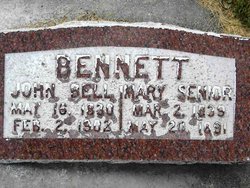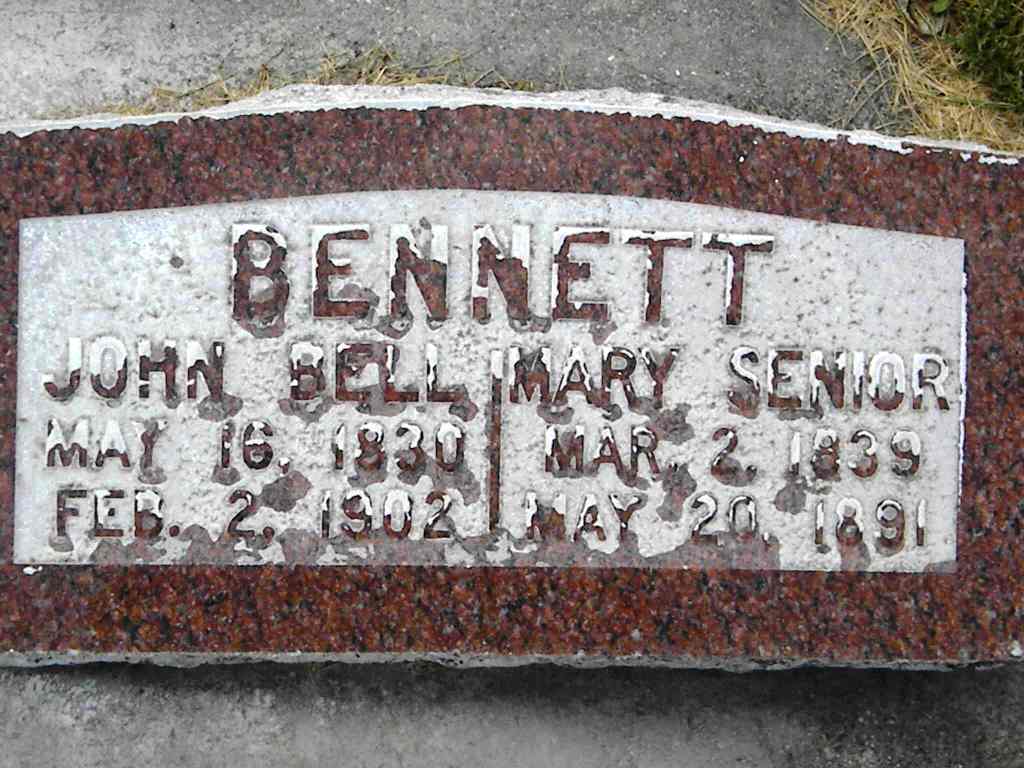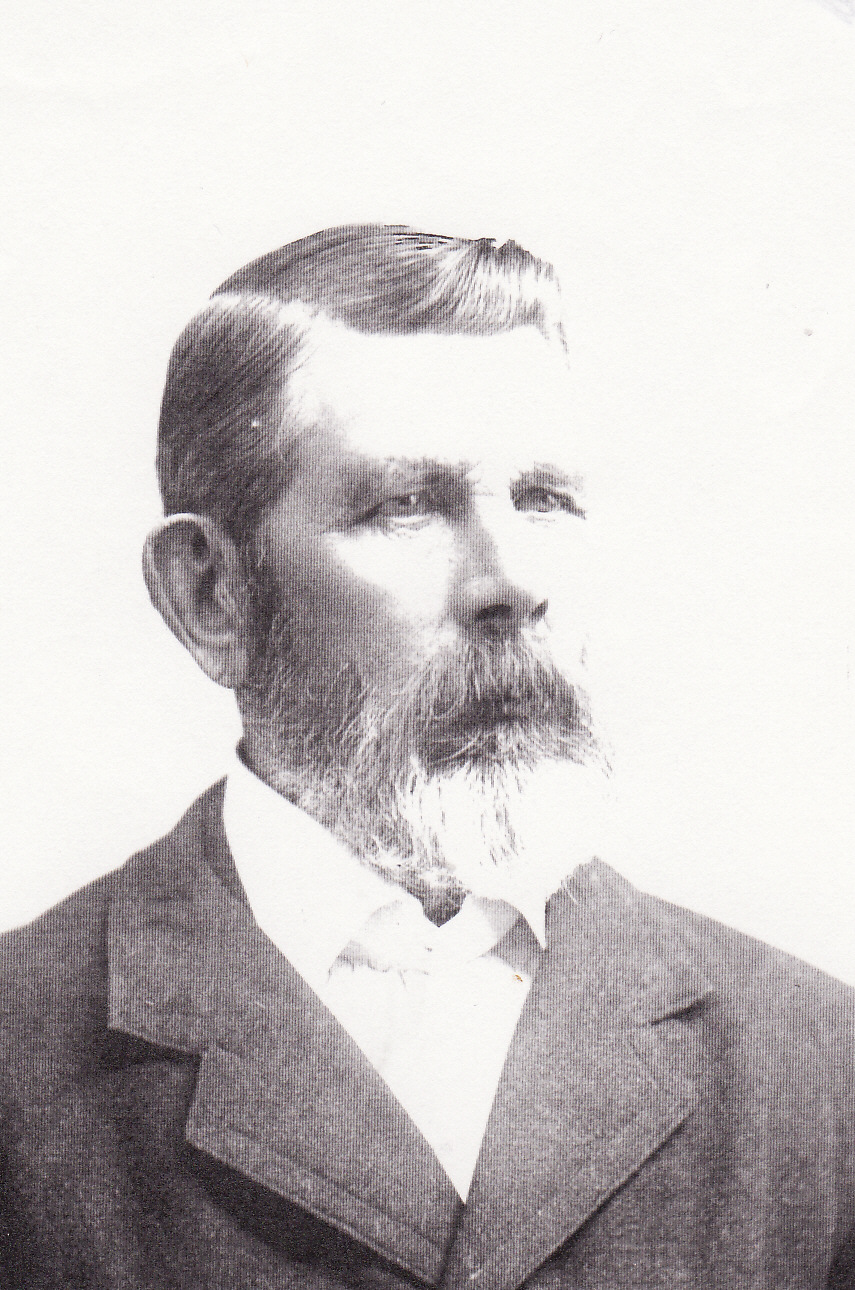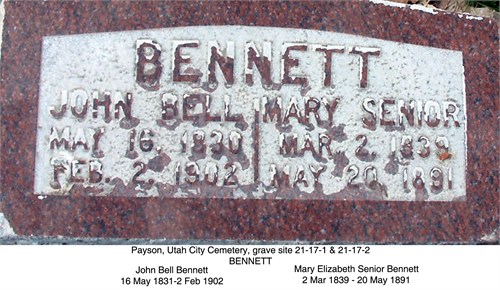Baptism records reveal that William joined the Church of Jesus Christ of Latter-day Saints in 1835, with Elizabeth, his wife, following in 1839. Of their children, Thomas McGuire was baptized in 1839, age 23; Hiram joined in 1842 at the age of 19; Martha in 1843, age 17 and Nancy Ellen in 1844 at age 11. John was baptized at age 20 after the death of his father and during the time the family was en route from Nauvoo to Utah.
John told his sons of a pleasant encounter with the Prophet Joseph Smith. The Bennetts were living in Nauvoo or in that neighborhood. John, who would be in his early teens, and a pal had walked some miles from home. In some way John sustained a stone bruise on his bare heel, which made walking a painful drudgery. As he limped homeward a carriage overtook them and stopped. The Prophet Joseph noted the difficulty and inquired of their identity and destination and invited them to ride home.
John's father, William, died of exposure during persecutions but before his death he called his family to him and told them to stay with the Church and to go West with it. They stayed at Winter quarters for a while and went to Kanesville with the Saints. They left Kanesville on April 15, 1851 -- mother, Elizabeth Bell Bennett, daughters Mary Jane McCauslin and Nancy Ellen, and sons, Hiram, Alfred and John. Erastus Snow was captain of the company. They arrived in Salt Lake, October 7, 1851.
John Bell Bennett used to tell his grandchildren many stories about crossing the plains. It seems that he must have been on guard at one time when he heard a sound in the nearby bush or growth of bushes. He, thinking it might be Indians, was ready to shoot if needs be, but who should appear in the clearing but Mary Senior (later Grandmother Bennett.) John stated, "I didn't shoot."
On one occasion John had the misfortune of breaking his ox yoke. He had to make another yoke with such tools at hand.
It appears John and others were scouting for a crossing or ford on a steam in order that the main company might cross the stream. They made their way across but owing to the lateness of the day, the party was counselled to wait until morning before crossing, but the scouts were advised to stay where they were. As John told it, "We didn't have anything to eat, so we hunted around and finally caught a buffalo calf, and that's what we had for supper and the next morning's breakfast."
After arriving in Utah, John hauled wood for fuel from the canyon, as well as doing other work with his team of horses.
Jesse McCauslin was husband of John's sisters, Mary Jane and Nancy Ellen. Every year Brother McCauslin sent one outfit east to help the saints migrate. John was driver of these teams.
Mary Senior was a small person, it has been told, and considered a beautiful lady. John was tall, slightly stooped, and wore a short beard. In later life his hair was partly grey. The slightly stooped back was caused from riding all the years he did within a wagon with no support at the back of the seat. As John courted Mary (an English convert), he took her for a sleigh ride one day and asked her to marry him. She consented because she respected him very much.
John and his wife, Mary first lived in Payson, Utah, and later moved to Provo. Frank was born in a rock house on Seventh East and Third North. Later they moved to the frame house on 7th North and 5th East, which became the home of son, John (Jack) and his wife, Mary. It is said that John prided himself on the nice table corn he grew. A sweet ritual existed between John and Mary about his corn. He always brought her the first offering of new corn -- she never went for it first.
They were the parents of twelve children, but lost two daughters and several sons in babyhood. It is told of John going alone in his wagon with the little casket on his knees, to bury one of his children.
During one incident John and his son, Jack went down town in Provo. Jesse McCauslin was the sheriff at that time. A wild bunch, part of the Butch Cassidy gang, used to come into town to the saloon (where the Academy theatre is now.) As John and his son were passing by the saloon, the wild bunch was making quite a noise. Jesse McCauslin, seeing John, came out and asked him to come in and help quiet the gang. John went in and told the gang to get out of town. They did just that. Jack said his Dad wasn't afraid of anyone. He was very tall and that in itself seemed to scare the gang away.
On one occasion one of his sons took it into his head to run away from home. John took a stick and went after him. Upon their arrival home, John stuck the stick in the ground and said, "This stick stays here until the next one runs away."
Evidently no one else ran away and they all obeyed because that stick grew into a big poplar tree by the family house and is still there now.
John and Mary's son, Jack, contracted the disease of spinal meningitis which left him totally deaf. Mary wouldn't let them take him away to school, neither would she write notes to him but instead she diligently taught him lip reading which helped him throughout his life. Mary Senior Bennett was taken by death May 20, 1891, leaving her family of sons and her husband to carry on for themselves. Frank, the youngest son, was seven years old at the time.
The boys often went with their father to bring wood from the canyon. On one such trip, John and his son, Joe, were walking in back of the wagon as it bounded along the rocky uneven road. Joe reached over the chain to adjust something on the wagon when his right wrist came in contact with the sharp axe-blade. Joe called, "See" as if he was bragging and held up his arm with the blood pouring out of his sleeve. The father made a tourniquet and stopped the flow of blood none too soon for Joe fainted from loss of blood.
As the boys grew older they took work out of town and left Jack and Frank with their father. John (the father) did the housework. Jack worked at the Knight Woolen Mills and Frank attended school. Jack was a spinner and a good one. He was paid in "factory script," though occasionally a downtown store would discount the script and accept it for goods. The script was of two kinds, cloth script which could be exchanged only for cloth produced at the mill, and produce script which could be exchanged for whatever was on hand at the little factory store. For a while Frank worked at the factory too as a spare hand earning 45cents a day, 5 cents an hour.
Frank remembered trips he and his father, John, took up South Fork for wood. The first day would be spent getting up the canyon, locating the wood, and dragging it down in the wagon. On the second day they would load and ride home. The green maple and oak were useful for firewood and dry aspen for kindling.
On one such trip Frank carried "Long John" a long barrelled muzzle-loading shot gun, more for sport than for protection. Upon arriving at their destination he went a few hundred feet from their camp and scared up a wild chicken, he killed it and fried it for supper. The weather was threatening so father and son made their bed under the wagon. During the night a clap of thunder startled them and they were grateful for the roof over their heads as the rain poured down.
John Bell Bennett was said by his oldest granddaughter to be a kindly man who never spoke a cross word to his grandchildren or anyone else for that matter. He was very quiet usually.
He and his daughter in law, Alice, wife of Austin, had a very close relationship, perhaps because he had no daughters of his own. He went there many times and when he was not well he went there for love and care and received it. It was at this home in Lehi that he passed away on February 2, 1902. His son, Austin, took him there because he was ill. A funeral was held in their home, also one in Payson where he was buried by his wife, Mary. His casket had to be made 6 feet and 11 inches because he was that tall.
Baptism records reveal that William joined the Church of Jesus Christ of Latter-day Saints in 1835, with Elizabeth, his wife, following in 1839. Of their children, Thomas McGuire was baptized in 1839, age 23; Hiram joined in 1842 at the age of 19; Martha in 1843, age 17 and Nancy Ellen in 1844 at age 11. John was baptized at age 20 after the death of his father and during the time the family was en route from Nauvoo to Utah.
John told his sons of a pleasant encounter with the Prophet Joseph Smith. The Bennetts were living in Nauvoo or in that neighborhood. John, who would be in his early teens, and a pal had walked some miles from home. In some way John sustained a stone bruise on his bare heel, which made walking a painful drudgery. As he limped homeward a carriage overtook them and stopped. The Prophet Joseph noted the difficulty and inquired of their identity and destination and invited them to ride home.
John's father, William, died of exposure during persecutions but before his death he called his family to him and told them to stay with the Church and to go West with it. They stayed at Winter quarters for a while and went to Kanesville with the Saints. They left Kanesville on April 15, 1851 -- mother, Elizabeth Bell Bennett, daughters Mary Jane McCauslin and Nancy Ellen, and sons, Hiram, Alfred and John. Erastus Snow was captain of the company. They arrived in Salt Lake, October 7, 1851.
John Bell Bennett used to tell his grandchildren many stories about crossing the plains. It seems that he must have been on guard at one time when he heard a sound in the nearby bush or growth of bushes. He, thinking it might be Indians, was ready to shoot if needs be, but who should appear in the clearing but Mary Senior (later Grandmother Bennett.) John stated, "I didn't shoot."
On one occasion John had the misfortune of breaking his ox yoke. He had to make another yoke with such tools at hand.
It appears John and others were scouting for a crossing or ford on a steam in order that the main company might cross the stream. They made their way across but owing to the lateness of the day, the party was counselled to wait until morning before crossing, but the scouts were advised to stay where they were. As John told it, "We didn't have anything to eat, so we hunted around and finally caught a buffalo calf, and that's what we had for supper and the next morning's breakfast."
After arriving in Utah, John hauled wood for fuel from the canyon, as well as doing other work with his team of horses.
Jesse McCauslin was husband of John's sisters, Mary Jane and Nancy Ellen. Every year Brother McCauslin sent one outfit east to help the saints migrate. John was driver of these teams.
Mary Senior was a small person, it has been told, and considered a beautiful lady. John was tall, slightly stooped, and wore a short beard. In later life his hair was partly grey. The slightly stooped back was caused from riding all the years he did within a wagon with no support at the back of the seat. As John courted Mary (an English convert), he took her for a sleigh ride one day and asked her to marry him. She consented because she respected him very much.
John and his wife, Mary first lived in Payson, Utah, and later moved to Provo. Frank was born in a rock house on Seventh East and Third North. Later they moved to the frame house on 7th North and 5th East, which became the home of son, John (Jack) and his wife, Mary. It is said that John prided himself on the nice table corn he grew. A sweet ritual existed between John and Mary about his corn. He always brought her the first offering of new corn -- she never went for it first.
They were the parents of twelve children, but lost two daughters and several sons in babyhood. It is told of John going alone in his wagon with the little casket on his knees, to bury one of his children.
During one incident John and his son, Jack went down town in Provo. Jesse McCauslin was the sheriff at that time. A wild bunch, part of the Butch Cassidy gang, used to come into town to the saloon (where the Academy theatre is now.) As John and his son were passing by the saloon, the wild bunch was making quite a noise. Jesse McCauslin, seeing John, came out and asked him to come in and help quiet the gang. John went in and told the gang to get out of town. They did just that. Jack said his Dad wasn't afraid of anyone. He was very tall and that in itself seemed to scare the gang away.
On one occasion one of his sons took it into his head to run away from home. John took a stick and went after him. Upon their arrival home, John stuck the stick in the ground and said, "This stick stays here until the next one runs away."
Evidently no one else ran away and they all obeyed because that stick grew into a big poplar tree by the family house and is still there now.
John and Mary's son, Jack, contracted the disease of spinal meningitis which left him totally deaf. Mary wouldn't let them take him away to school, neither would she write notes to him but instead she diligently taught him lip reading which helped him throughout his life. Mary Senior Bennett was taken by death May 20, 1891, leaving her family of sons and her husband to carry on for themselves. Frank, the youngest son, was seven years old at the time.
The boys often went with their father to bring wood from the canyon. On one such trip, John and his son, Joe, were walking in back of the wagon as it bounded along the rocky uneven road. Joe reached over the chain to adjust something on the wagon when his right wrist came in contact with the sharp axe-blade. Joe called, "See" as if he was bragging and held up his arm with the blood pouring out of his sleeve. The father made a tourniquet and stopped the flow of blood none too soon for Joe fainted from loss of blood.
As the boys grew older they took work out of town and left Jack and Frank with their father. John (the father) did the housework. Jack worked at the Knight Woolen Mills and Frank attended school. Jack was a spinner and a good one. He was paid in "factory script," though occasionally a downtown store would discount the script and accept it for goods. The script was of two kinds, cloth script which could be exchanged only for cloth produced at the mill, and produce script which could be exchanged for whatever was on hand at the little factory store. For a while Frank worked at the factory too as a spare hand earning 45cents a day, 5 cents an hour.
Frank remembered trips he and his father, John, took up South Fork for wood. The first day would be spent getting up the canyon, locating the wood, and dragging it down in the wagon. On the second day they would load and ride home. The green maple and oak were useful for firewood and dry aspen for kindling.
On one such trip Frank carried "Long John" a long barrelled muzzle-loading shot gun, more for sport than for protection. Upon arriving at their destination he went a few hundred feet from their camp and scared up a wild chicken, he killed it and fried it for supper. The weather was threatening so father and son made their bed under the wagon. During the night a clap of thunder startled them and they were grateful for the roof over their heads as the rain poured down.
John Bell Bennett was said by his oldest granddaughter to be a kindly man who never spoke a cross word to his grandchildren or anyone else for that matter. He was very quiet usually.
He and his daughter in law, Alice, wife of Austin, had a very close relationship, perhaps because he had no daughters of his own. He went there many times and when he was not well he went there for love and care and received it. It was at this home in Lehi that he passed away on February 2, 1902. His son, Austin, took him there because he was ill. A funeral was held in their home, also one in Payson where he was buried by his wife, Mary. His casket had to be made 6 feet and 11 inches because he was that tall.
Gravesite Details
Son Austin Robert Bennett #23319803
Family Members
-
Mary Catherine Bennett
1863–1864
-
John William Bennett
1864–1864
-
![]()
Austin Robert Bennett
1866–1942
-
Ellen Elizabeth Bennett
1867–1867
-
![]()
William Hyrum Bennett
1869–1947
-
![]()
George Edward Bennett
1871–1872
-
![]()
John Bell Bennett Jr
1872–1946
-
![]()
David Alfred Bennett
1874–1945
-
![]()
Sidney Redfern Bennett
1876–1877
-
![]()
Samuel Senior Bennett
1876–1951
-
![]()
Joseph McGuire Bennett
1878–1944
-
![]()
Franklin Tennyson Bennett
1881–1957
Sponsored by Ancestry
Advertisement
Explore more
Sponsored by Ancestry
Advertisement






















